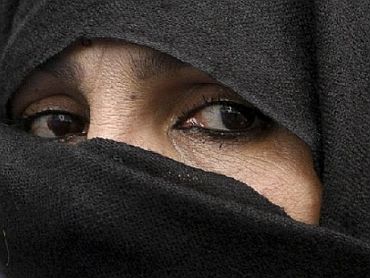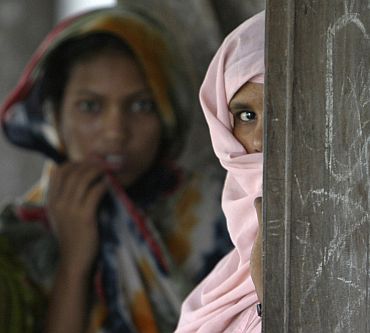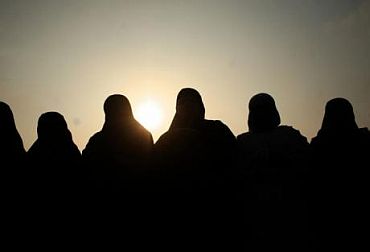 | « Back to article | Print this article |
Muslim women speak up! Want laws coded
Muslim women have sought the codification of Muslim personal laws, which, they felt, were being twisted and misused to the disadvantage of women.
Activists of the Muslim Mahila Andolan, who converged from different parts of the state in Lucknow on Sunday, also demanded "immediate ban" on the malpractice of divorce by sheer tripe utterance of the word 'Talaaq' on which a debate is already been going on in certain parts of the country.
Prominent among those who addressed the gathering at the Mahila Natya Kendra in Lucknow were former Communist Party of India-Marxist parliamentarian Subhashni Ali, Mumbai-based woman activist Noor Jehan Safia Niaz and Ahmedabad-based activist Zakia.
Click on NEXT to read further
Muslim women speak up! Want laws coded
Speaking to media persons, Muslim Mahila Andolan founder Naish Hasan said, "We are in the process of preparing a draft for codification of Personal Laws that were often misinterpreted to the disadvantage of women."
She said, "Our meet expressed deep concern over the negative attitude of certain class of Islamic Maulanas who were out to oppose anything that would benefit Muslim women. However, what we all wish to ask is that when Islamic personal laws have been codified in most of the Islamic nations, including Malaysia, Egypt, Turkey, Morocco, Bangladesh and even Pakistan, then what is the hitch in doing so in India?"
Muslim women speak up! Want laws coded
Naish was of the view, "It has come to our notice that often Maulanas cite pre-Islamic diktats as laws of the 'shariat', which needs to be checked."
Speakers at the meet unanimously resolved to strongly oppose this "malpractice" and "misuse" of the 'shariat', which they felt was distinct from Muslim personal laws.
They gave a call to launch a nationwide movement in that direction.


